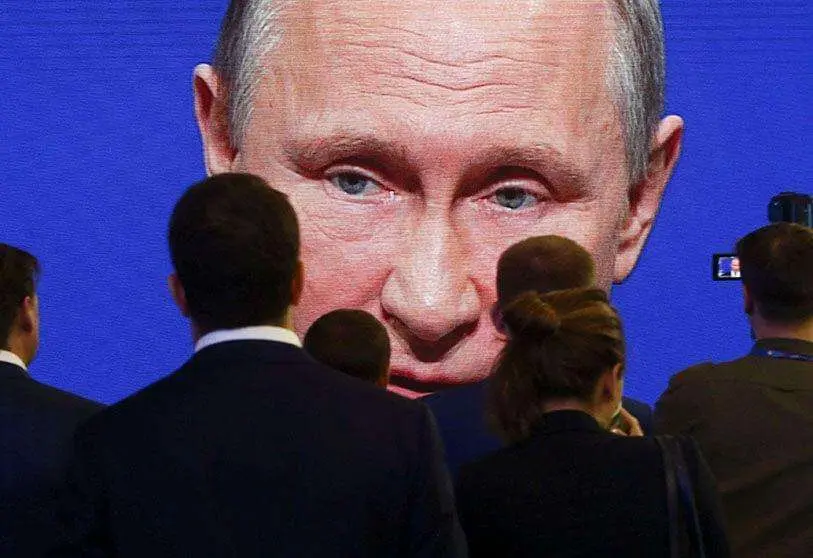Putin announces a new multipolar world

Vladimir Putin, President of Russia, proclaimed the end of the unipolar world led by the United States. "That era is over," said the Russian leader during the St Petersburg International Economic Forum.
The Russian leader was expected to speak at this important economic summit in St. Petersburg, where he has usually delivered important messages when he has spoken in recent years. During this event, Putin accused the American giant of believing itself to be "God's envoy" after the end of the Cold War era, which meant the end of the Union of Soviet Socialist Republics (USSR) and the classification of the United States as the main world leader through the disappearance of its greatest rival in the communist sphere, Soviet Russia. "In claiming victory in the Cold War, proclaiming itself to be God's envoy on earth, the US has no obligations, only interests, and, by the way, those interests are sacred," Putin stressed, as reported by EFE news agency.
Speaking from St. Petersburg, the Russian president decreed the end of the unipolar world led by the United States despite the West's attempts to preserve it "by all means". That era "is over, despite all attempts to maintain and preserve it by all means. Change is a natural process of history," Putin said at the St. Petersburg International Economic Forum. The Russian president accused Western leaders of ignoring "revolutionary and tectonic changes", which he considered "irreversible".

"They do not realise that in recent decades, new and powerful centres have been formed on the planet, each of which is developing its own political systems and public institutions, and implementing its own models of economic growth," Putin said, as reported by media outlets such as Infobae. These countries have the right to defend and guarantee their "national interests", the Russian president stressed. These new centres of power to which Putin alluded are mainly to be found in Asia, with China and India as important representatives, and in Latin America and Africa. Indeed, Russia sealed an important economic and political pact with China shortly before the invasion of Ukraine that guaranteed it significant income from trade with China, which has helped it to cope with the current economic sanctions imposed on Russia by the West. Vladimir Putin's country has also been increasingly present in various African countries with military consultancy and financial investment activities, demonstrating the importance Russia attaches to these new centres of power.
In fact, Putin pointed out that China is already the world's largest economy and that the US has gone from being an agricultural power to a mere importer.
"They believe that the hegemony of the West in world politics and economics is a constant, it is eternal. Nothing is eternal. Our colleagues not only deny reality, they try to obstruct the march of history, they think as if they were in the last century, they are hostages to their own lies," he insisted, alluding to the new stage opened up by Russia's recent demonstration of power through the invasion of neighbouring Ukraine that began last February under the pretext that it was intended to "denazify" and "demilitarise" the Ukrainian country.

Russia has also sought to prevent the approach of North Atlantic Treaty Organisation (NATO) lines to its own borders as a threat to the nation. Indeed, Vladimir Putin went so far as to warn not only Ukraine, but also Finland and Sweden about their contacts with the Atlantic Alliance. Nevertheless, the Finnish and Swedish governments recently proceeded to apply for official NATO membership, abandoning their traditional neutrality as they watched Russia's invasion of Ukraine unfold.
In economic terms, the war on Ukrainian territory is also having negative consequences, such as the rise in the price of raw materials like oil and gas or foodstuffs like wheat, but Vladimir Putin has also pointed the finger at the St. Petersburg economic summit, as he considers that the United States has caused a major economic crisis due to its financial irresponsibility. Putin pointed out that the US has gone from being an exporter to an importer, showing, he said, the decline of the West and the US as its main leader.
Putin also included the European Union in his criticism for following US political postulates and for having a political structure that does not work. The Russian president was not concerned about Ukraine's EU membership, as the EU institution is not a military entity. The Russian leader insisted that the old Western "patterns" no longer work and that politics should not be governed by the wishes of a single power such as the United States and its allies. The Russian leader also explained that the Western economic initiative launched against Russia is doomed to failure and that the economic sanctions received are double-edged because they will cost the EU more than 400 billion dollars.

Regarding the war in Ukraine, Vladimir Putin claimed that Russia's military intervention in Ukraine was the perfect "lifeline" for the West to blame Russia for "its own miscalculations". The Russian president defended the invasion of Ukraine on the grounds of defending the pro-Russians in Donbas and fighting for Russia's right to free and secure development as a country.
However, the St. Petersburg International Economic Forum demonstrated Russia's international isolation, as only the President of Kazakhstan, Kassym Yomart Tokayev, attended as head of state or government, and he did not agree with the recognition of the independence of the pro-Russian republics of Donbas, considering this a dangerous precedent that could lead to other conflicts around the world.








